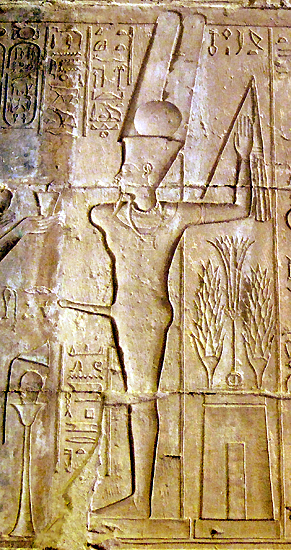Relief on a wall of the temple of Deir-el-Medina, near Luxor, dating
to the New Kingdom (about 1500-1100 B.C.), representing the ithyphallic
god Min, personification of the fecundity and fertility of fields and
animals. During the ceremony of the new pharaoh’s coronation a
ritual was celebrated in Min’s honor, so that the virility and
power of the god would be passed to the new king, who was responsible
for the fertility of the entire country. Since the Middle Kingdom, Min
was associated with other divinities, like Horus, the falcon-headed
god, or the great creator god Amun. The original function of the ithyphallic
god was thus incorporated as one of the multiple aspects of these great
deities (Remler 2010).
[Image: http://en.wikipedia.org/wiki/Amun]


